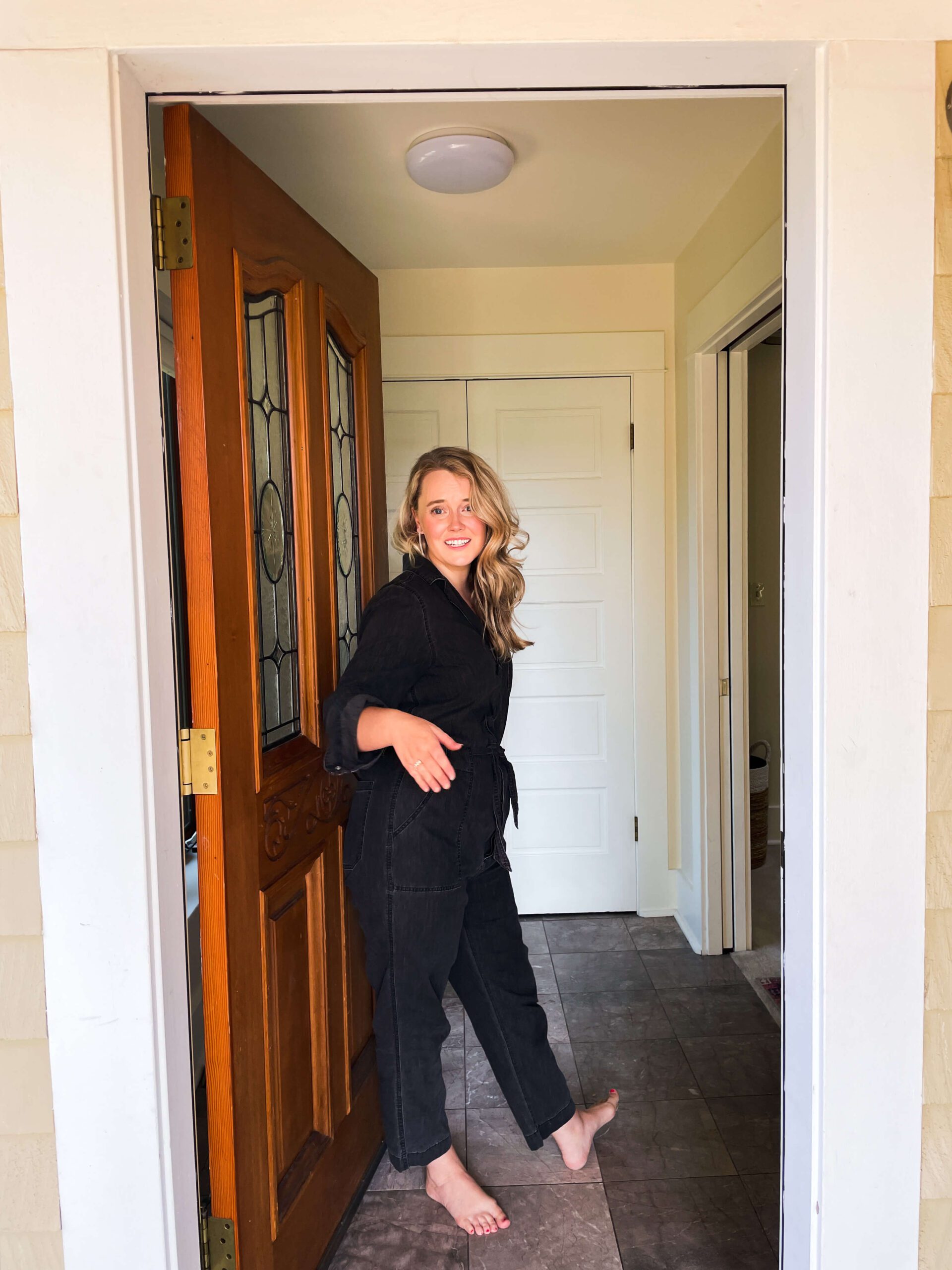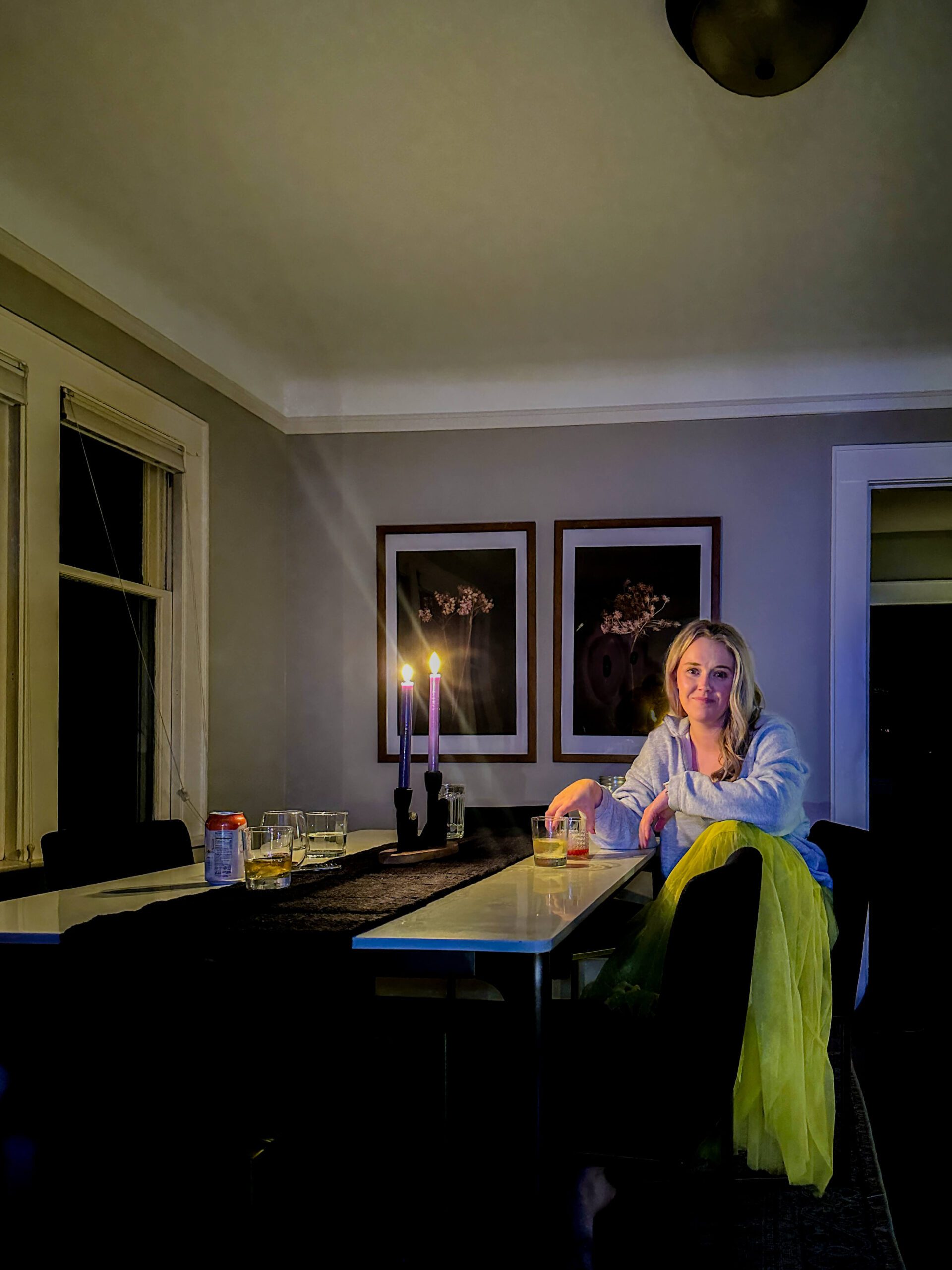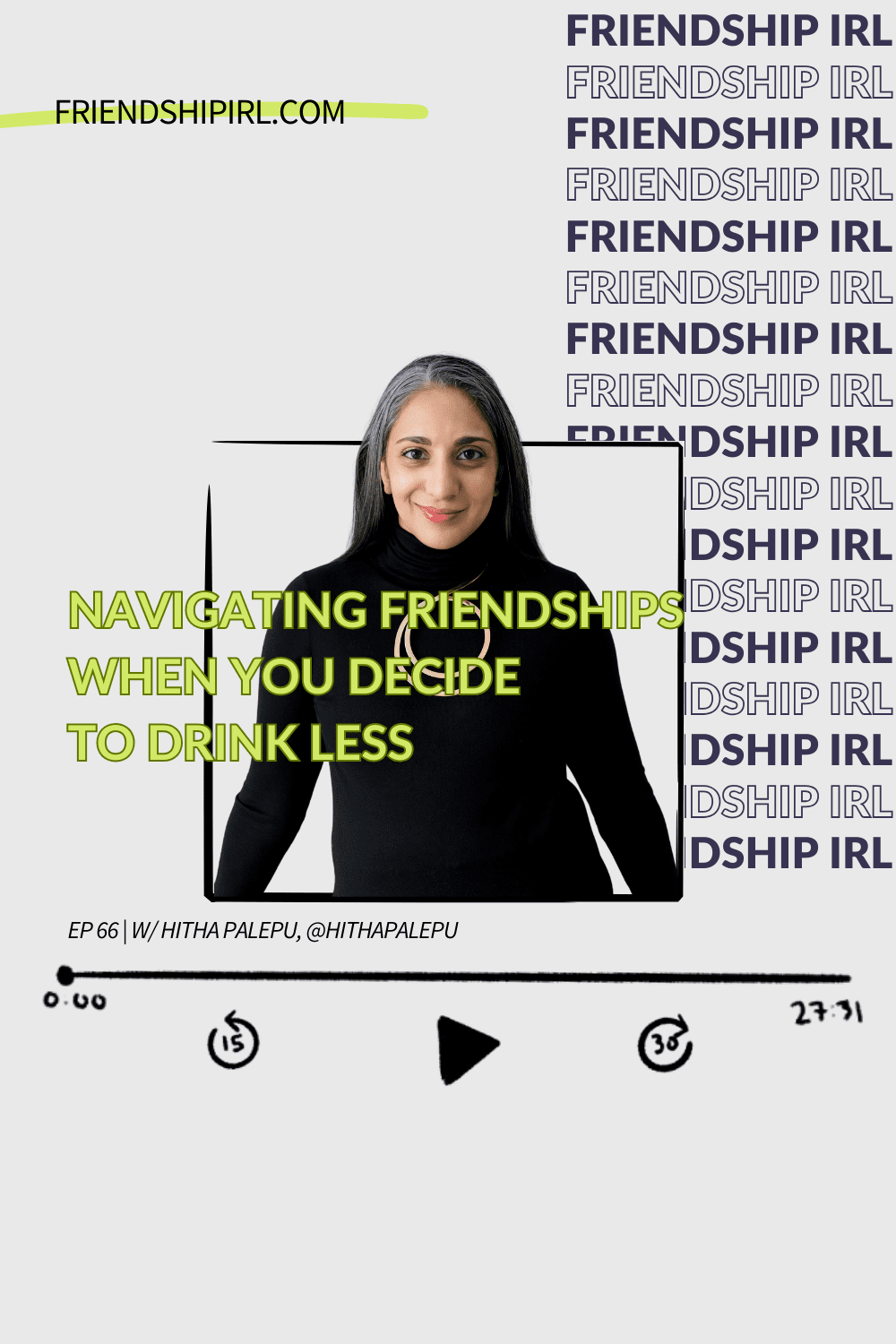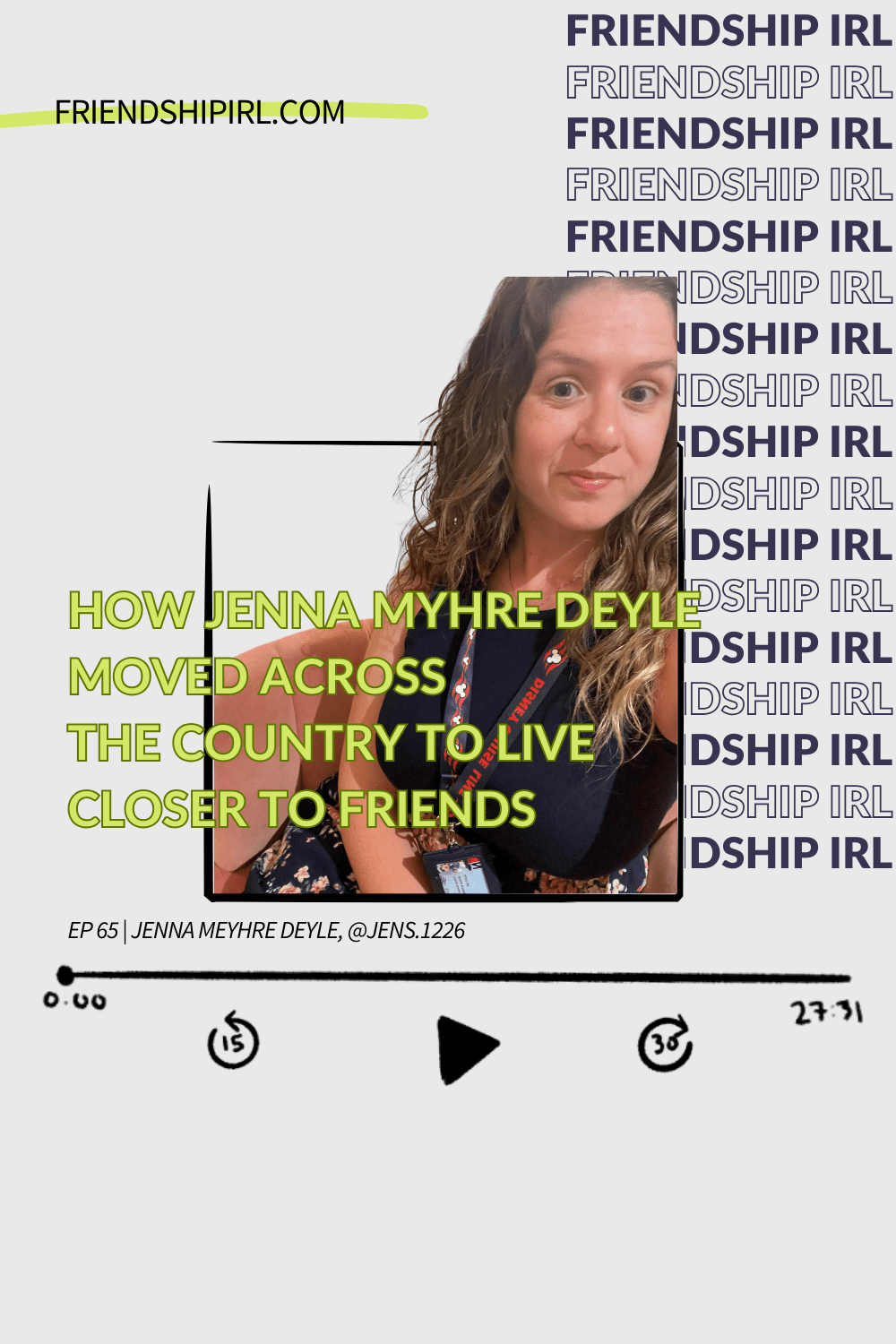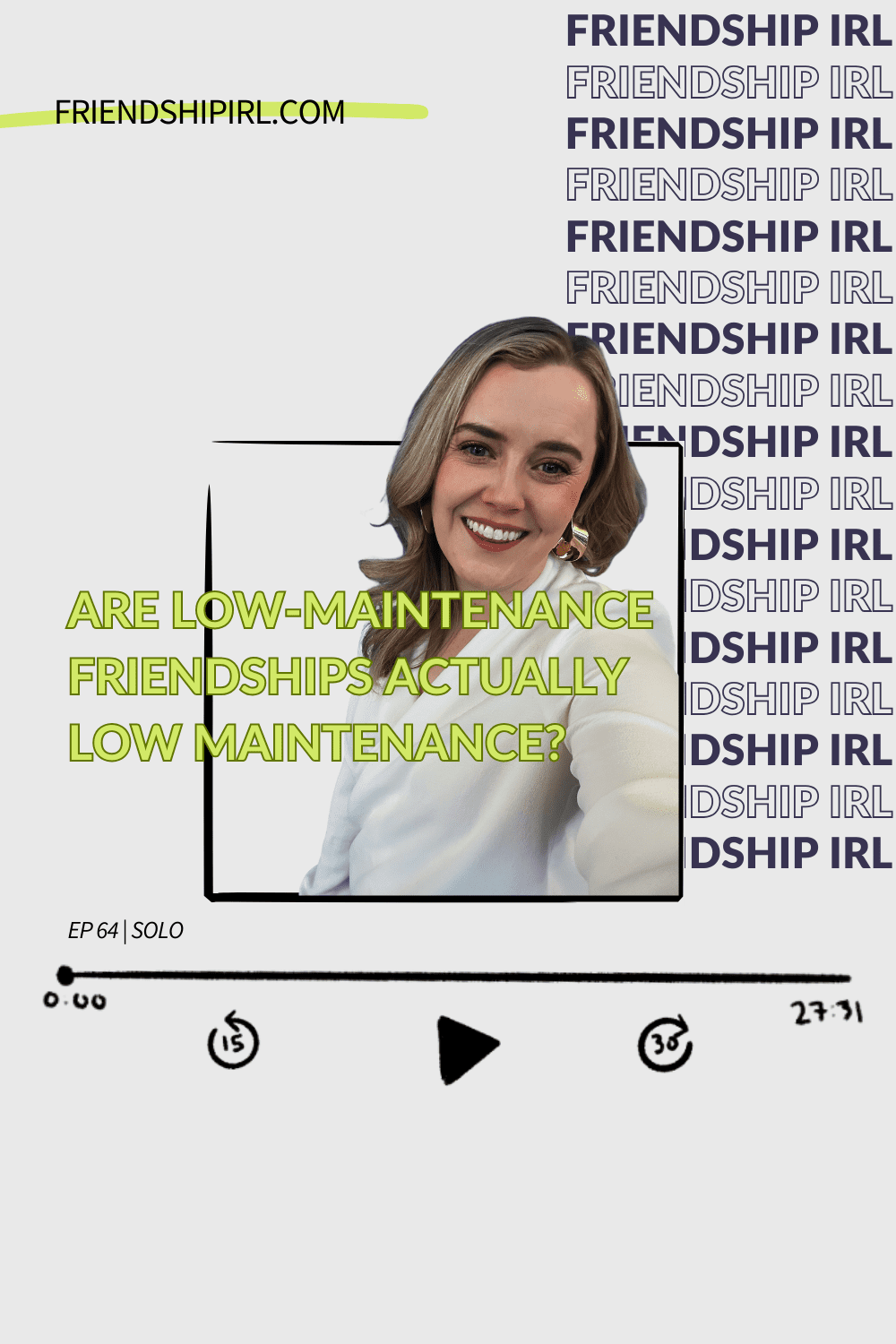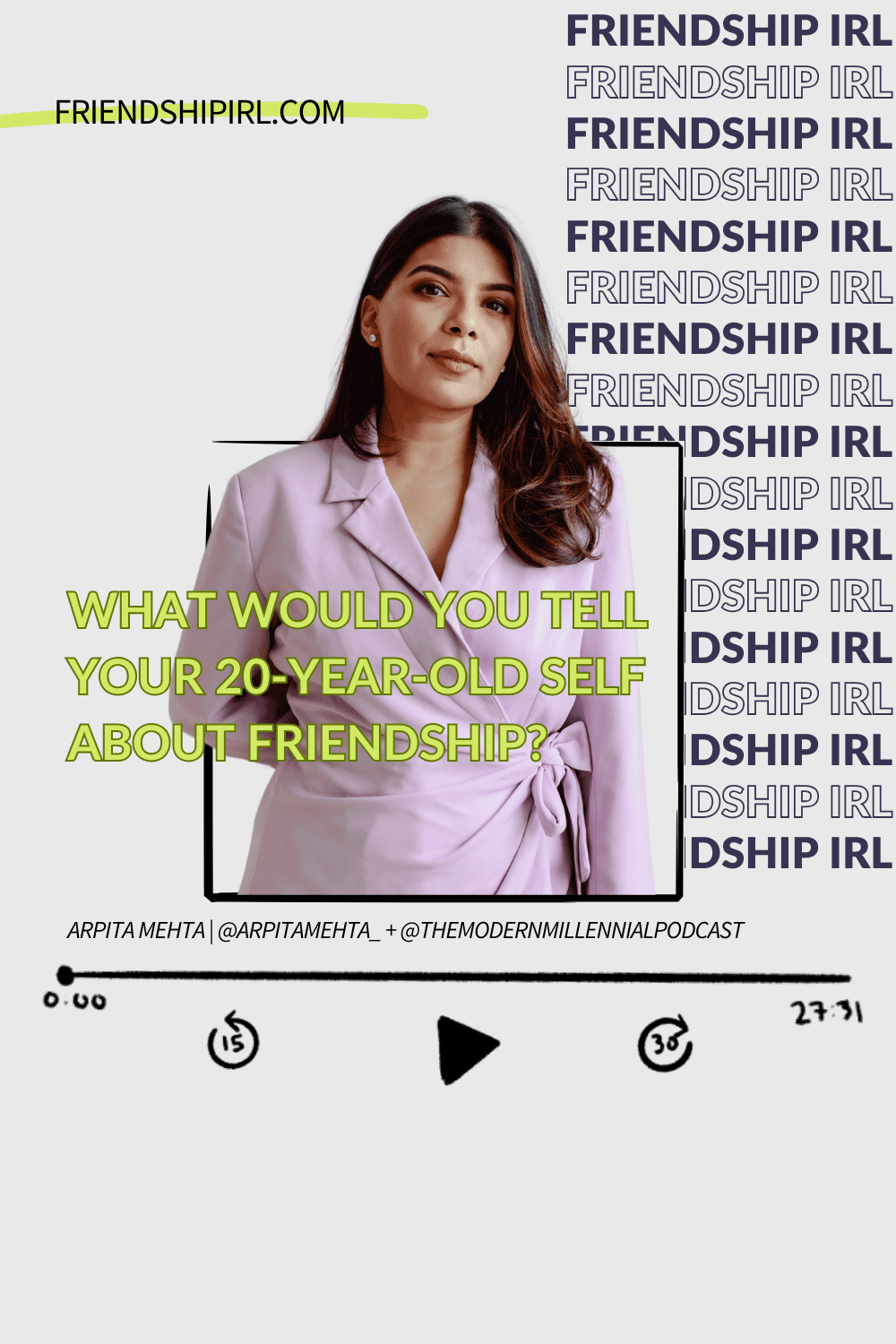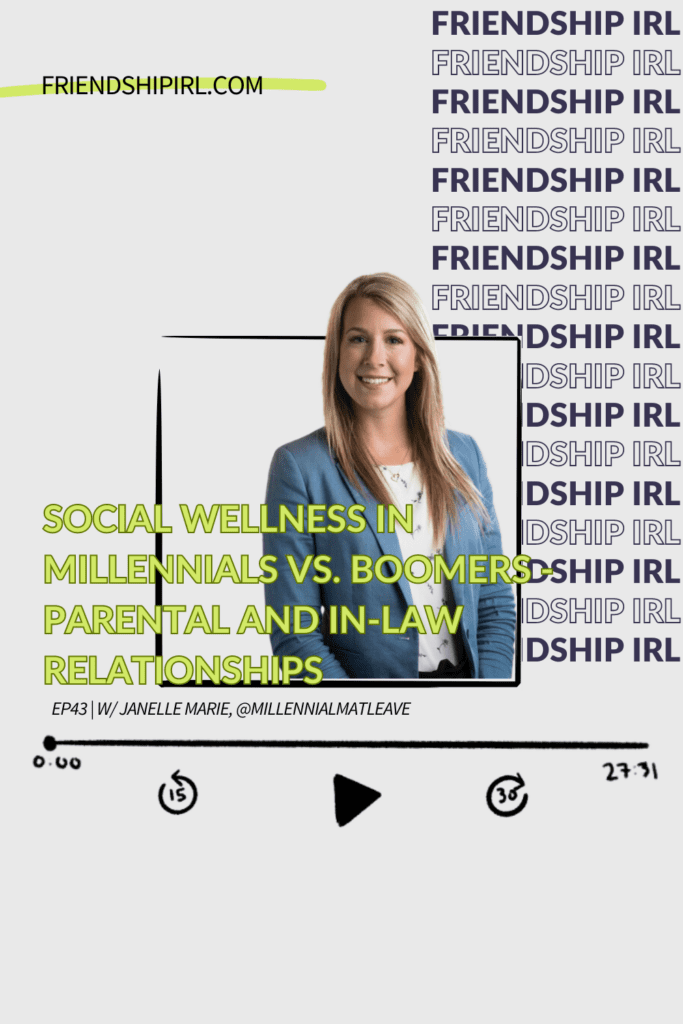
Podcast Description
A year ago, I went on a walk with a friend who’s around the age of my parents. I shared how I wished my parents and in-laws found other people to talk to besides just me. Doing so would not only make them happier – it would take some pressure off, too!
At the end of the walk, my friend said she saw herself in my story. And I actually think a lot of people will see themselves in this story. Boomers and Gen X generations were told by society that focusing on careers and families would bring fulfillment.
The impact? So many of them don’t have a robust social wellness net. This is an important (and possibly divisive!) topic that we’re talking about today with Janelle, whose online platform tackles motherhood and that sometimes tricky relationship with the in-laws.
I hope this episode helps start a conversation about the impact our own social wellness can have on our parents, children, and in-laws – that way, we can put our attention there and work on it.
In this episode you’ll hear about:
- Janelle’s platform, which contains content about motherhood and navigating in-law relationships – how it started, and how it’s going
- Generational expectations and pressure, and how much of this comes from older generations not having strong social wellness situations or hobbies
- The impact of social media on wellness – the good and the bad – for different generations, Gen Z to Boomers
- The skill set required to take a friendship out of shared experiences, plus, the importance of modeling friendship for your kids
- The easy ask – asking someone close to you for advice or help, even if they’re not the right person – and how this can weigh heavily on the people we love
- The problem with the “family is family” perspective and creating NEW rules and boundaries
Reflection Question:
Did you see friendship modeled by your parents or guardians growing up? How did this impact your relationships today?
Notable Quotes from Janelle:
“You need people in your life who are going to tell you things you don’t want to hear. And that doesn’t mean you want people in your life who are just always going to be the devil’s advocate. Like I said, you need people who are effective listeners, who let you say what you want to say, and say okay. And then give you a call the next day and say, ‘You seem really upset about that. I don’t know that that’s a productive thought for you moving forward. Do you want to talk about it a bit more?”
“What I’m really passionate about is bringing awareness and community to women who have struggled with the relationship they have with their mother-in-law. It’s a challenging dynamic that’s hard to navigate and can feel very isolating when you’re going through it. And because of the large generational gap within that social structure, there’s a lot of different factors and a lot of different reasons why women can have a challenging relationship with their mother-in-law to varying degrees.”
Resources & Links
Follow Janelle on TikTok and her website, both of which are are place for confidence and communication tips while navigating in-law relationships.
Leave Alex a voicemail!
Until next time…
Take the conversation beyond the new podcast on friendship! Follow Alex on Instagram (@itsalexalexander) or Tiktok (@itsalexalexander), or send her a voice message directly with all your friendship thoughts, problems, and triumphs by heading to AlexAlex.chat and hitting record.
Episode Transcript
Podcast Intro/Outro 00:02
Alrighty, gang. Here’s to nights that turn into mornings and friends that turn in family. Cheers!
Podcast Intro/Outro 00:18
Hello, Hello, and welcome to the Friendship IRL podcast. I’m your host, Alex Alexander. My friends… They would tell you; I like to ask the hard questions. You know who I am in the group? I’m the person that’s saying, “Okay, I’m going to ask this question, but don’t feel like you have to answer it.” And now, I can be that friend for you, too.
Alex Alexander [Narration] 00:50
Recently, I’m thinking about how all I get as positive feedback. How even though I push and push on reframing the way you look at things or asking difficult questions. I don’t have any internet haters yet, knock on wood. However, today’s episode, I understand might make people frustrated. I have a very, very diverse audience that listens to this podcast. People from around the world, people with different privileges or lack thereof, people of different ages and generations. So I know that today’s episode might make some people frustrated. Honestly, some people might not even have made it this far, they might have just seen the title on the show notes and thought, absolutely not. Before we dive into the episode, I want to tell you a little story. Maybe a year ago, I was on a walk with a friend. And this is an intergenerational friendship. She is about the age of my parents. And I was sharing with her some recent frustrations I had had with parents and in-laws, how I felt like I was their only support, and how intense that was. How I wanted them to go out and find other people they could talk to, like how I really want that for them. Because I believe it’ll make their life richer, they’ll be happier, won’t be so lonely. But also so it takes a little bit of the pressure off of me. She listened quietly, really, really thought about it. And at the very end of the walk, she looked at me and she said, “You know, I realized that some of the things you said today, my children have said to me. But it was a lot easier to hear it from you. When I hear it from you, I don’t feel like a bad parent. But I can see myself in your story in a way I can’t when my kids give me this feedback.” So maybe that’s my plea. If you are of an age where you have adult children, you are Boomer, Gen X. I really hope that you don’t feel like today’s episode is an attack. Now there are two millennials on here with some frustrations. So I get that that may not feel great. But for the most part, this conversation is really about how I think in all these conversations out there about family dynamics and frustrations and boundaries and estrangement, we are missing something huge. We are not talking enough about the fact that Boomer and Gen X generations, they were really told by society to focus on their career and their family, and that that would bring fulfillment. And that someday when you no longer had a career, you would still have your family and that would be fulfillment. So looking at the research, I understand why Boomers and Gen X often maybe don’t have as robust of a social wellness net, because that wasn’t what society told you made you successful. They didn’t even tell you it was a priority. And I know this because when I talk to millennial and Gen Z people, they tell me all the time that they never saw their parents have friends. Like friendship wasn’t modeled. They don’t even know what it looks like to have adult friends. They don’t know what it looks like to balance raising kids and having friends. So please don’t feel like this is an attack. The whole hope of this episode is to maybe just bring awareness that this might be a factor if there are frustrations in your family. And if we can see this as a factor, we can put our attention there, we can work on it, we can have more conversations about it. But I have yet to see any of the therapists or reporters or whatever, talk about how social wellness, or the lack thereof is putting a lot of pressure on younger generations, and therefore might be a piece of the puzzle when it comes to setting boundaries or resetting expectations, estrangement, difficult dynamics. Finally, I want to say that if you are of those younger generations, if you are frustrated, if you are having these conversations with parents, and they’re not being heard, please know that this podcast, this place, is somewhere for you to go to figure out how to build what you need. Like if you’re at a loss, if you’ve reached the point of extreme boundaries or estrangement, we talk about how to build what you need here. Whatever that looks like. That could be a robust family situation. That could be a little more friends and family, it could be all friends, whatever you need you can build. So if you’re at a place where you are just so frustrated, you don’t know what to do anymore, you don’t have to go without that support. You can build what you need, even if it’s not coming from the places you thought would. So with that, let’s get into it. I’m already bracing myself might be the most divisive episode so far. But hopefully, you’ve all surprised me before every time I’ve been nervous. Hopefully, this actually just create some really, really, really beautiful conversations.
Alex Alexander 07:10
Hi, Janelle. How are you?
Janelle 07:13
I’m very well, thank you. How are you?
Alex Alexander 07:15
I’m good. I’m really excited that you’re here. And I’m excited that it’s your first podcast recording.
Janelle 07:23
It is my very first podcast. I’m very excited. Thank you for having me.
Alex Alexander 07:27
Hopefully we have you, you know, hooked on podcasting by the end of the episode. I don’t know, I when I did my first podcast episode I got off and I thought to myself, like, wow, that was really easy. I could totally do that all the time. And now, I don’t know, like a year and a half, two years later, this is what I do all the time. But, you know, for anybody who’s listening, Janelle and I chatted once on Zoom, have messaged a little bit. We don’t know each other. I found you on TikTok. The TikTok algorithm served up your content to me, as it does multiple times. And after a few times, I obviously started recognizing your face. And then I clicked on your profile. And I was like, oh, yeah, I want to follow her. I watched a little bit longer. Isn’t the internet weird? The internet is so weird, if you really think about it this way. And then after, I don’t know, a few more days, you posted some video. And I immediately messaged you saying, “Hey, I really want to talk about this one particular topic on the podcast and I can’t… I have yet to find anybody who’s the right fit. I think you might be it. Do you want to talk about this?” So I’m really excited you’re here. I’ll talk a little bit more about what that topic is, but do you want to tell people about your platform and the kinds of content I was getting served on the algorithm? Like what do you talk about on the internet?
Janelle 09:00
Sure. So I started a TikTok page, even though I’ve been a consumer of TikTok since the app started essentially. I finally was brave and started sharing generalized experiences about having a challenging relationship with your mother in law. Now my platform has blossomed into other things like recipes and motherhood content. But that’s definitely one of my core pillars that I share about and I’m really passionate about it bringing awareness and community into women who have struggled with the relationship they have with their mother in law, because it’s a challenging dynamic that’s hard to navigate and can feel very isolating when you’re going through it. And because of the large generational gap within that social structure, there’s a lot of different factors and a lot of different reasons why women can have a challenging relationship with their mother-in-law to varying degrees. And so that’s what I share about. I share with relatable anecdotes, I share advice sometimes satirically, sometimes…
Alex Alexander 10:07
Oh, yeah. We got to laugh about it sometimes.
Janelle 10:10
Anyways, yeah. That’s what I share about on the internet for the last three months, at least, it’s going on.
Alex Alexander 10:15
I mean, this is something that people obviously want to talk about, want to feel not alone in, because you have amassed quite the following very quickly. Like, somebody needs to be talking about this. So I’m happy you posted that first video. And you just said, why not? Obviously, you’re way more than just this one topic. But from personal experience, if anybody’s like, “Oh, now I know what kind of content Alex is getting served on. TikTok.” A challenging relationship with your mother in law is a hard situation to navigate. I know from personal experience. So I love that you’re talking about it.
Janelle 11:00
I think for a long time, it’s been like the inlaws is like a classic trope in movies and television, and probably books I’ll read the whole time. But there’s more to it than that. It’s not just… I could see there was a lot of content on the internet related to like, bashing mother in laws or just complaining about the in law dynamic in general, but then what? Like, okay, but no one is really having a productive conversation. And truthfully, my pages and a page where I’m hoping to start a two sided discussion, my page is… that sometimes ends up happening, but my page is really for the women who have suffered on mistreatment to, like I said, varying degrees and making them feel less alone.
Alex Alexander 11:49
And like crowdsourcing people’s experiences, and what is working, what’s not working, resources they’re going to, what they could try.
Janelle 11:58
Yeah, I’ve started a Facebook page, that’s uber-hidden to the point where it’s invite only. It’s a subscription based Facebook page, also for an added level of privacy and security. And it’s going really well. So far, we have over 150 women in the Facebook group. And so it’s just incredible the experiences women all share. There’s a woman in the group who had a baby shower coming up. And much like a lot of women in our season of life can relate to there’s a lot of really big milestone events that happen. And so, those are events that it just sort of becomes even if you have a challenging relationship with someone like a mother-in-law, they’re default going to be invited, and how do you navigate what’s supposed to be a really celebratory day for you and your family while this person who really seems like it’s their mission to make it about them and make you miserable is going to be there? Yeah, so that’s one example of… she’s been sort of taking us through and the group, like the leading up to her baby shower, and just all the comments and the support that pour in and I can’t believe how needed… like there was a Reddit thread, I think there’s a few Reddit threads where people share these crazy stories about their mothers in law. But again, that’s not really… that’s a place where you go and it’s like shock value. And you’re like, whoa, that’s crazy. But what about the person on the receiving end? Like what about actually after you share the Reddit story, the next day and the next family function? Like how do you move forward in this relationship? And that’s what I’m hoping to continue to help people and support people and build a platform around is coaching women through this struggle through communication and boundary setting and self-confidence and openness with their partner and getting on the same page. Because there’s obviously a lot of factors at play. And yeah, I’m able to help the people that I’ve been able to reach so far. And then it’s polarizing. There’s a lot of people on my Tiktok page that have identified the need to work through and talk about the challenge of having an estranged relationship with your parents. But that nuanced dynamic of it not being… it’s now your, all of a sudden, immediate family, however long you’ve been with your partner prior to getting married. And so, again, referencing the generational differences, it’s just sort of expected that just because you’ve married this person, they now assume all privileges as a parent. When in actuality, people are getting married more commonly in their late 20s to early 30s now. Using the heterosexual dynamic there but to meet a 30 year old woman or 28 year old woman and expect to just exist now in her life as this default ‘I have to respect to everything you say’ figure when she’s established her sense of self for independence, often her career, she’s got her own family, she’s got her own friends, hopefully maybe. That I think is really challenging for both parties. But we’ve got a lot of emotionally attune millennials ready to be agile and adapt to that dynamic, versus a lot of older Gen X and baby boomer mothers-in-law, who perhaps hadn’t anticipated that there would be this, “Oh, wait, my son’s gonna get married to this woman who is more than just his wife, and is going to have expectations for…”
Alex Alexander 15:36
As their own self, and isn’t just gonna like fall in line to whatever you’ve set in your family. Yeah.
Janelle 15:44
Yeah, I could tell there was a big space or not a big, but there’s quite a few creators who share a lot about it being their own family. And not that that makes it any easier. It’s just different. Because what I’m finding is the women that I connect with, some have partners that are on the exact same page as them. And some are somewhere in the middle of where they can’t even really openly, candidly share with their partner how they’re feeling, or their partners still have the mindset of like, just continue to… don’t worry about it, or like she’s always been this way, or whatever it is. That’s really invalidating and it’s sometimes not as big of a deal where they’re ready to end their relationship, but they want to know, okay, how do I navigate these waters with this other person who is likely been sustained to this treatment their entire life, but isn’t really ready to heal or doesn’t know that they need to, or any number of things? It’s a bit of a basket of cats. It’s,
Alex Alexander 16:45
Yeah, talk about taking on, you know, I feel sometimes like I’ve taken on this really overwhelming and intense topic talking to you and like, oh, okay. We’re just navigating a bunch of trapdoors here all the time.
Janelle 17:00
We are. I’m very careful to make sure I’m not like… I’m not a therapist, I’m not a licensed social worker, I’m just a girl with an MBA, who likes communication and thinks that through effective communication, sometimes you can at least find a path for yourself that you’re comfortable with. And that’s what I’m hoping to help women with. Like, healing past trauma is a job for a therapist, definitely. But my goal is to help women create a plan that they feel comfortable with, that they can action, and get alignment with their partner and move forward in a way that makes them feel at peace. Rather than this being something that is awful. Every family event or every milestone, like that being something that you have to have all these considerations for. It’s just silly, you know?
Alex Alexander 17:57
I do, yes. Okay, so now everybody knows why I was so excited to have you on here. What I want to talk about is something that I think is being left out of this conversation, like generational expectations, pressure conversation. I follow because we now have covered, you know, in all the creators and the therapists and the people that I have read their content and seen what they’re putting out there, there are talks about boundaries, and there are talks about what to do if you are estranged. And there’s, I mean, dozens of other topics. I went back before this episode, and looked through five of these people’s content to see if I could find anything about social wellness, loneliness, or lack of hobbies because my theory is that one of many factors, this is not the only factor by any means. But one of the factors we’re not talking about is that these older generations, the Boomers and Gen Xers, a lot of them don’t have a very strong social wellness situation. They focused a lot on work and family as a generation. Not so much on hobbies, or other connections. I can’t tell you the number of people I talk to who are millennials where when we are discussing friendships community, they will tell me like, “I never saw my parents have friends. We hung out with maybe some extended family. They went to possibly some sort of community group or religious organization.” But they’re like, “My parents didn’t have friends.” And now the common thread when I talk to friends who have a lot of frustrations with strained relationships with their parents or their in laws, because I’m curious about this stuff, I generally ask them like, “Do your parents have friends? Do they have hobbies? Do they have things that they do to fill their time?” And more often than not, they say, “No”, or, “Well, they have a couple people that they see. But they don’t actively reach out or do things with them.” Which then means that a lot of their social wellness needs fall back on their children and their grand children, which is a lot of pressure, to be always wanting to spend time together. You’re the only person checking in on them. You’re the default person to go do activities, even if you don’t want to do them. The point of this episode really is just the hope that talking about this might for some people be an aha moment of, oh, maybe this is a part of the problem. Because I haven’t seen anybody talk about this. Have you seen anybody talk about this?
Janelle 21:28
I haven’t. And touching on this topic in my Facebook group, actually, last night, one of the girls just sort of out of nowhere asked, “Why is this such a prevalent issue? Like why is this happening?” And she wasn’t specifically talking about in-laws, who don’t have hobbies or in laws who are putting all their social wellness chips in their children’s basket, but she was specifically talking about like, is it just mothers of boys that are struggling with this? Like, why is this such a pervasive issue? And so, no, I haven’t seen anyone talk about it. But as someone who talks about it now, I can see why. Like, it’s so divisive, it’s so polarizing, it’s pretty taboo. There are still a lot of people who think exactly like you were talking about at the beginning. Family is family. And it’s a lot of still hush hush, it’s a lot of people don’t want to quote “air” their dirty laundry, which… I mean, my intention is never to offend. My intention is never to stereotype. It’s to let’s try to discover here, why has this happened. So that would… we’re mothers in law. My children are babies, but when when I’m a mother-in-law, hopefully in the next 20 or 30 years, we’ll have a breadth of understanding about what are some of the risk factors here that can lead these dynamics astray? What are the things to watch for? And I think, definitely, if not, a main factor, a definite contributing factor is overall fulfillment in where you’re at in your life. And a huge component of that, regardless of your age is, yeah, social wellness, and interests and social connections. And the other piece, in addition to the topic we’re talking about today in my opinion, is compounded on that what’s happened, as you’ve described in a lot of cases that you’ve observed, and I’ve observed as well, which I think is definitely true, where baby boomers just sort of expected that this is how it was gonna go. It is that lack of communication? Like, I don’t think anyone who’s found themselves in this situation was ever explicitly communicated by their parent at 15, or 20, or whatever age. Just so you know, I don’t have a lot going on outside of my job and raising you. So hope you like, insert whatever the parents interest is, because my expectation is you’re going to do that with me. Right? Like, that’s not a conversation.
Alex Alexander 24:05
No, because if that was a conversation at a certain point, somebody would have said, like, “Oh, well, I don’t really like that. Do you think you want to go meet some people who do?” Or if some older baby boomer or Gen Xer had said, “I expect that we’re going to see you multiple times a week and that every weekend is spent with you, once you have kids or reach a certain age. I need to see you X number of times a month.” They probably would have been like, okay, well, not sure how that’s going to fit in with raising my own kids, a partnership, my career, my passions, my friends. Like yeah, I want to see you but like, I can’t be it. And I think that’s what’s ended up happening to a good number of people is a lot of these older generations, it’s kind of similar actually to, I hear this from women who want to be moms and are trying to get pregnant. And then they don’t have friends. Because life changes have happened, right? People have moved careers, and whatnot. And people will tell me, I’ve truly had people tell me this. And they’ll say, “Well, I’ll just make mom friends when I have kids.” And you’re waiting for like this next, quote-unquote “life stage”. And I think this happens also with the Baby Boomers and Gen Xers. Like my kids have left at a certain point, I’m gonna retire. Maybe they find a couple of things, they start playing golf or whatever. But there’s this idea of, we’ll all just wait until I’m grandparents or I’ll just wait until you’re done living across the country, and you move back home, or I’ll just wait until this. But that’s still depending on their kids and their grandkids, putting like all this pressure on that,
Janelle 26:08
I think there was probably also just like a… because they weren’t… if they are now, I can tell by my comment section that they weren’t really active users of social media. And we do know that social media is a benefit and a curse, right? There are situations where social media is making people, women, and anybody make feel more isolated, because they feel like everyone is having so much fun. Meanwhile, it’s like the highlight reel of their life or whatever the case is that we know that that’s a downfall of social media, in terms of your mental health related to friendships and socialization. But the benefit for those of us who have grown up with social media is we’re able to very quickly, a lot of the time, make connections, make meaningful connections, and nurture connections that we’ve already had. Whereas I think, with likely the older generation, I think there was probably… like, they weren’t great at recognizing that a lot of these relationships and friendships that they had, either at their place of employment, or maybe through other… like through their children, whatever that look like, we’re surface level, you’re seeing this person every day because you go to work, and they know so much about you and you’re chatting with that, but you’re busy with your own stuff after work, or it’s after work. So you just hang out with your husband or not, or whatever you do.
Alex Alexander 27:29
Yeah. They haven’t figured out how to take it outside of that, which would make the law they didn’t realize
Janelle 27:33
that. Yes. So they retired and then they’re like, oh, I don’t talk to anybody anymore about any… I don’t go to work and have those conversations. Even for myself. I’m currently on maternity leave. And I’m surprised that yes, there’s a few friends I have from work that I’m still in connection with readily. But there’s also friends at work that, you know, some of my closest comrades at work that I haven’t talked to in the nine months I’ve been off work. And it’s like, there’s no hard feelings there. It’s just, we’re work friends. If we’re not working together, I don’t like… I have enough other friends. And I’m not necessarily checking in on them.
Alex Alexander 28:09
Yeah, it’s a skill set to take a work friendship, I call that defined friendships, you’re really connected about one area of life, one shared experience, and develop, I call them roots, other connection points, basically. Because you have to take a little bit of a risk and invite them to do something outside your comfort zone, you have to set that up, you have to initiate it, you have to follow up and create consistency. And that is not something that Western culture as a whole, is doing very well. So then they retire. And even if you are going to a bowling league or whatnot, if you never really develop that skill of how to take it outside of bowling league, you’re still siloed in only these one connection point friendships, which can be really beautiful. But then I guess if you compare them to the richness of your family and your kids and your grandkids, obviously, there’s going to be a vast difference. But if you could learn the skill sets to form these more present friendships that touch on more areas of your life, again, those are never going to replace or compete with your kids or your grandkids, but they can be another really fulfilling area of connection.
Janelle 29:37
But I think that same skill set that they’re lacking is the reason why there’s so much tension and animosity in these expected, quote-unquote “friendships” that are supposed to just appear out of nowhere with their adult children. Because in a lot of these cases, when we’re speaking generationally, they’re still… because I said so parents, they’re still… because I’m your mom parent, theyre still, you know, like all the different stereotypes that we can go into about how the baby boomers raise their kids versus how we’re raising children now. And that’s not to say that you were supposed to be your child’s best friend. I think there’s science supporting the fact that that’s not ideal either. But ultimately, if you’re not evolving, and the relationship isn’t evolving with that, it sounds like this skill set that they’re likely not utilizing, or perhaps don’t even have, then all of a sudden, you’re expecting your child to be your friend when you don’t even know them on that level. And so, it’s also expected to be this one-sided dynamic, where we all know that’s not a fulfilling friendship. It needs to go both ways.
Alex Alexander 30:44
This is why I love not formally doing like a scripted episode, because sometimes things just appear. And I hadn’t really thought about this. I don’t know how much you’ve dove through my website, but I have this whole… my book is on this theory that I call my roots theory. And one of them is called story roots. So it’s basically the beliefs we hold about our friendships. But if I’m being honest, I think that all this stuff I talked about applies to all relationships. So I think it really applies here. So it’s like the beliefs you have. So if you meet someone, and you hit it off on that first meeting, and you leave, and you’re like, we’re going to be best friends. The expectations you have of that relationship are pretty high, you haven’t had enough experiences together to actually have evidence that you are, in fact, acting in ways that support this belief.
Janelle 31:40
It’s like falling in love on vacation or summer camp, right? Like, not real life, it’s one…
Alex Alexander 31:45
Yeah. And we get… there’s three ways we get these story roots. One is we actually collect the evidence. Another one is we just pick the belief like on vacation or deciding initially. The third one is from societal messages. So listening to you talk about that, basically, when you get married, the societal message about your in laws is their family. And our family comes with a very long list of expectations. But there’s really no interactions or evidence or very minimal because it’s only probably been a few years of time versus their child with decades. And whether that evidence even supports that belief is a whole other piece of it. But now, this goes back to what you’re saying about communication that these new family members, the daughters-in-law, are acting towards this belief with these expectations that they didn’t even pick, the other person’s not really reciprocating maybe in the same way. And it’s just creating this experience of you can say whatever you’re going to say, but that doesn’t align. So why would I buy into it?
Janelle 33:08
They go hand in hand, right? I think a person who has social wellness in the form of hobbies, friendships and other interests, they’re just naturally going to be more socially agile to meeting a new person and to just see people.
Alex Alexander 33:28
Overall building, co-creating together, yeah.
Janelle 33:33
They’re better equipped to navigate the organic development of a new relationship. Whereas someone who has had sort of forced friendships because coworkers are just you work with who you work with. And, yeah, it’s great that you make it work. But I think that’s what they’re expecting to happen a lot of the time with an adult child or an inlaw, because of family, but also because while this is a person that my adult child has decided to spend their life with, so now we’ll make it work come hell or high water. When it’s like, have you even communicated what making it work looks like for you? And that’s just silly. That’s just not how millennial adults in general have adult relationships anymore. That there’s an expectation of reciprocity when it comes to respect. And that just is what it is. And I think different people have different levels of tolerance for how much they’re willing to withstand. But that’s when these dynamics go sideways a lot of the time, but related to social wellness and other hobbies, when you don’t have so much pressure on the relationship to be on this… like perform to this pedestal that you have in your mind for yourself because you’ve got other things to do, and other people to see and other conversations to have, it doesn’t become so consequential if you have this interaction with your child that isn’t exactly how you thought it would go. Like you’re not dwelling on it, you’re not hanging on it, you’re not… because you’re gonna go to the gym the next day, or like, go see your friends or go to a book club or whatever you’re gonna do.
Alex Alexander 35:10
Yeah, if your kid sets a boundary and can’t help you for some reason with, I don’t know, picking up from the hospital after a small procedure, I’m not saying we’re like, completely ignoring our merits and big moments, but, you know, you be like, oh, I understand. And it’s okay, because I have other people to call who will help me. But if you have kind of put all your social wellness eggs in one basket, then that boundary suddenly is, okay, well, if you say no, I have no one. Who do I call? How do I find the support I need?
Janelle 35:48
And then you get into the guilt, right? And then naturally, a statement, exactly like you just said, is said to the adult child, which is an objectively true statement, but very much feels like a guilt trip when it is directed at you. You’re like, okay.
Alex Alexander 36:07
Oh, yeah. And you feel guilty. But we’re what we’re not talking about and we are in this episode, but most people are talking about I think is, people need to be responsible for building their own support system and their own social wellness, that you can’t put that on someone else. You have to create what you need. And if that has been ignored for a very long period of time, just like other areas of health, like financial wellness, if you’ve ignored your finances, at a certain point, you have to dive in and pick yourself up.
Janelle 36:44
Figure it out. Yeah.
Alex Alexander 36:46
And so, you know, if you had a financial issue, it’s not fair to look at somebody else in your family, a sibling, let’s say and say, okay, well go fix it. I need you, you do this now. So why does it get to be that way with social wellness? We’re not pointing the mirror back kind of and saying, okay, well, you need to go supplement this so that I am a part of it. But I am not completely it, and you have to go build yourself some additional support.
Janelle 37:22
Like if we think of it, everyone gets up in arms whenever I find… whenever you try to equate or parallel the dynamic with a parent or parental figure with truly any other relationship, people literally don’t hear the rest of the sentence because they immediately think exactly like you said, family is family or but it’s your parents, whatever it is. But again, we’re talking about two adults that yes, that is your parent. But if we’re talking about two adults who are trying to build an adult relationship, still rooted in parent and child, but different now that the child is an adult and independent. Think about that type of dynamic and any other relationship context, right? Think of the needy girlfriend or the needy boyfriend. When it’s a girlfriend or boyfriend who doesn’t have anything else going on, like that would be, to your peers, they would say red flag. You know, they wouldn’t say this is probably a person that’s not going to be healthy for you. But when it’s your parent doing that to you, that’s apparently appropriate. Right? Like, it isn’t. It isn’t appropriate.
Alex Alexander 38:31
It isn’t appropriate. And obviously, everyone’s situation is different. You have kids. I do not, right? So everyone has additional pressures. But then there’s this other situation that’s happening, where Millennials are now getting… like having to be the social support for their children and their parents. And that’s a lot. Trying to build their own and teach their kids how to do this someday, so that they’re never in the situation.
Janelle 39:04
And have a career or whatever they’re doing.
Alex Alexander [Narration] 39:08
I just want to clarify what I’m talking about here. So I mentioned earlier in the episode that when I talked to a lot of millennials, they tell me that they were never modeled friendship and community that their parents, growing up, they spent time with extended family or they attended places of worship, things like that. They didn’t. A lot of them have close friendships, or really any friendships I hear quite often, which is unfortunate and sad and lonely. But what that means is that this millennial generation is really sandwiched with this problem on all sides. This was not a priority for or older generations and studies show that the boomer, Gen X generations were really told like to be successful, have kids be great at your job. And then when you retire, you’ll be a grandparent. Social wellness, friendship connection was not seen as a marker of success. So I get… I get why they, as a generation, didn’t invest time here. But what that means is that we have this generation who hasn’t spent a lot of time thinking about social wellness, cultivating those habits or skills, and building their broader support system. I have millennials, who are listening to this podcast, who are over here trying to figure out how to do this for themselves. I also have a lot of millennials, Gen Z, who are listening and wanting to not have their kids repeat this scenario. So now we have millennials, Gen Z trying to repair themselves, while also satisfying the older generations, social wellness needs that are falling on them, and try and teach their kids. And that’s just a lot. But I really feel like what I hear from a lot of people is that, that’s your reality.
Alex Alexander 41:28
I look at this, I’m not gonna call it a trend, like this overwhelming pattern of strained family relationships, and estrangement. And all the people starting to talk about this and there are a myriad of factors. But I just don’t think this one’s been addressed. And if we lay it out in that sense, like this generation is being thrown so many really difficult scenarios at once. And we’re just not talking about the fact that this is an added pressure on us, that really isn’t our problem.
Janelle 42:07
Well, and I think that again, people elect not to talk about it, because they put it on this pedestal of family as family. But when we look at it pragmatically, which is talking about humans who, in general, are in a really, really resource-intensive season of life. And naturally, humans are going to travel to the path of least resistance. And if that relationship in your life is a point of resistance, it’s just organically going to be something that you start to avoid. And then it becomes whose responsibility is it to repair that connection or to alleviate that tension. And I think the jury’s still out on that, because, again, who has the bandwidth to start to begin, to navigate those waters. I’ve talked about this on my TikTok page, and it really was divisive. But if you’re a resistance point, and that millennial who’s in a really busy season of life, they’re going to avoid that resistance point, because it doesn’t make them feel good, it’s a detriment to their mental health. You’re just not going to see your grandkids that much. And that’s really sad. But also not putting so much pressure on a relationship and being able to work your way through those challenging moments and boundaries, when there’s that expectation, maybe that wasn’t communicated. And you can just be open about it and move forward. There was a situation at Christmas time where my mom was hosting some people over. And out of all my cousin’s coming, I was the only one who had children. And my son, my second was very, very young. And we had just moved into our new house. So there’s a lot of things on the go, busy. And of course, everyone’s got their own stuff on the go. But my mum had asked me what I was going to bring, I hadn’t volunteered to bring anything yet. And she said, “What are you going to bring?” And I was sort of standoffish about it. I was like, I’ll bring buns, which is sort of, in my mom’s world, that would be a cop-out, like just buying buns and bringing them. And so she kept following up, “You’re just going to bring buns?” Finally I just said, “Mom, is this like, you’re going to be embarrassed to my aunts and uncles if I’ve only brought buns? Is that what you’re trying to tell me?” And she just sort of snapped in an instant. She said, “Janelle, you’re an adult. It’s a group dinner. Everyone has to bring something, you know that.” And I said, I’m the only one bringing dependents. So I’m okay being the bad guy here and saying perhaps we can implement a new rule. I thought you had to bring me and my sister and a potluck item, and all the presents and everything. But like, could we not implement a rule? Can we break that pattern? Because we have that open report, she was like, oh, wait, this isn’t about me. You’re right. And now we have the rule where if your family has a child that cannot walk themselves to the door, you don’t have to bring anything, just bring your family.
Alex Alexander 44:55
I love that rule. A lot of people are gonna listen to this and implement that rule.
Janelle 44:59
My hands are physically full. If I have to make two trips to the car, no. My children can walk themselves and I can carry the gifts in the potluck item. Good. Like, that’s our new rule.
Alex Alexander 45:10
Honestly, somebody who doesn’t have kids, I would tell you not to bring anything. I tell our friends that have kids not to bring anything every time except the children, if they want.
Janelle 45:21
Great. But as I’ve seen in my… in my comments, there’s so many people who wholeheartedly disagree, they think that why would you come empty handed, you have to bring something. And that’s where we get into those undertoned, implicit-laced expectations that aren’t being communicated. And so whether it’s expectations of how you’re going to exist at family functions as an adult, or how you’re going to exist in their life as an adult, if that hasn’t been effectively communicated in a way that you’ve been able to gauge that there’s mutual understanding.
Alex Alexander 45:54
Communicate it and co-create it. That’s the other thing. Like, you can communicate. My mother in law can communicate all she wants, that does not mean that is going to be the end agreement, we have to discuss and come up right with the, I don’t have kids, but if I had kids, like I have children, I will not be carrying this. You can’t just say the thing, which, as we’ve mentioned before, is definitely a skill that is cultivated more when you have friends. And you can’t just walk in with these expectations, like you have to figure it out in each relationship.
Janelle 46:34
Right. Like friendships don’t last long if there’s a person who’s unilaterally deciding everything for the group, right? But yet, that seems to be the dynamic. And the expectation in these, a lot of these parent-child adult dynamics is a parent has unilaterally decided how their child is going to exist in their life forevermore. And that just doesn’t make sense. Like, I think that when you look at just the overall aspect that having a bigger social network, how that benefits, just your overall ability to be able to navigate this type of situation, also the aspect of checking yourself, right? And so I know for my parents, they’ve respectively got their own friend groups, they’ve got friend groups that they have as couples. And so I don’t doubt that my sister and I have gone through things before where they’ve relayed what’s happened, or they’re venting, or they’re lamenting, whatever it is. And they’re getting real-time feedback from their friends, who aren’t family members, right? They aren’t family members who also unconditionally love me and my sister, right? Like, let’s just be honest about that. Whereas I think if you’re lacking that social wellness network outside of people who are either family, or essentially might as well be family because they’ve been your friend since you were 19 and now you’re 60, they also watched your child grow up. They also were nearly a parental figure to your child. And so you’re not really getting like a true devil’s advocate perspective on whatever your thought is on the topic. And I think that that’s really helpful. I know, for my mum, having seen what I’ve gone through, my mum has a lot of friends who are a bit younger than her. And so their children are just sort of starting to get into serious relationships. And some of her friends have brought topics to their gym class, or whatever they’re doing.
Alex Alexander 48:36
Yeah their time together.
WANT DEEPER FRIENDSHIPS?
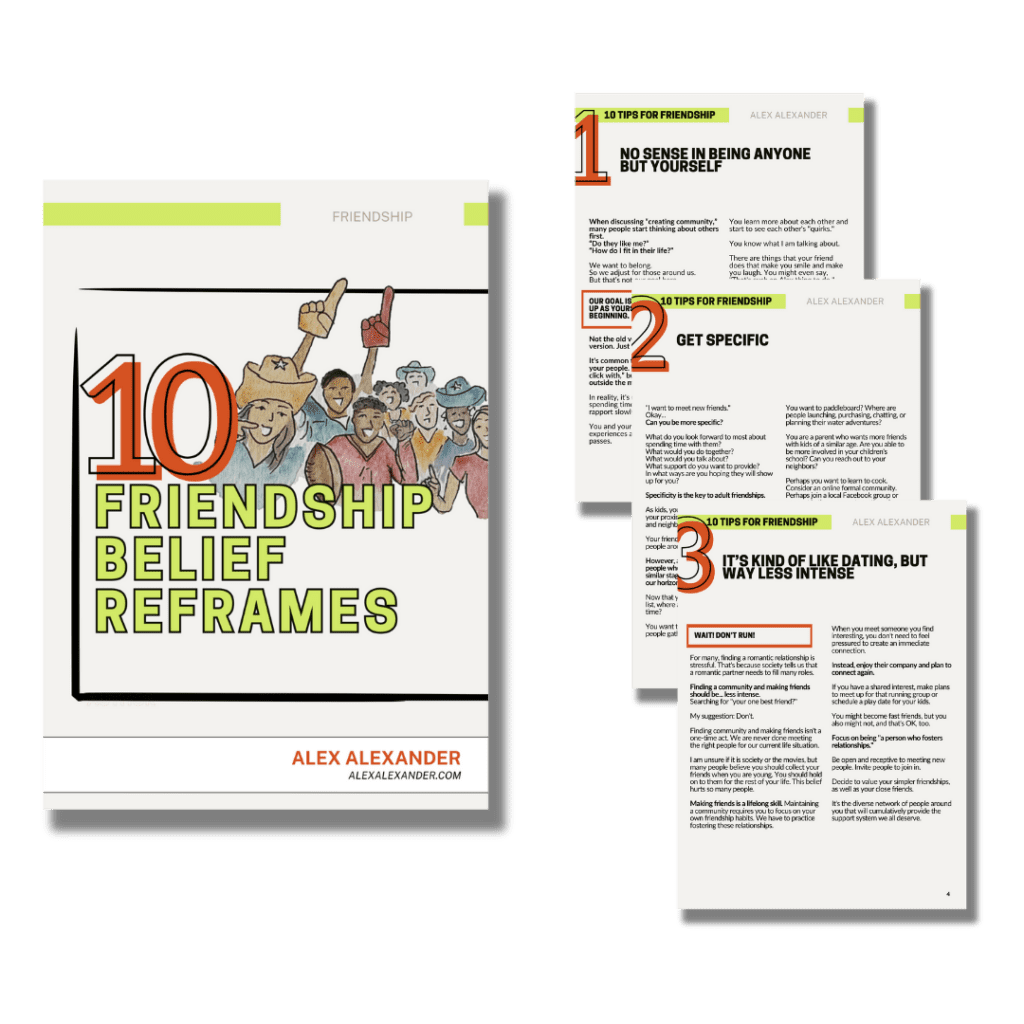
I AM GIVING AWAY MY SECRETS TO BETTER FRIENDSHIPS.
Reinvigorate your friendships and learn how to create stronger ones by incorporating my Top Friendship Reframes into your life. BONUS! An exclusive look at my upcoming book. Want to bring more purpose and value to the relationships that matter to you? Download the guide now.
Podcast Intro/Outro 1:13:53
Thank you for listening to this episode of Friendship IRL. I am so honored to have these conversations with you. But don’t let the chat die here. Send me a voice message. I created a special website just to chat with you. You can find it at alexalex.chat. You can also find me on Instagram. My handle, @itsalexalexander. Or go ahead and leave a review wherever you prefer to listen to podcasts. Now if you want to take this conversation a step further, send this episode to a friend. Tell them you found it interesting. And use what we just talked about as a conversation starter the next time you and your friend hang out. No need for a teary Goodbye. I’ll be back with a new episode next week.

